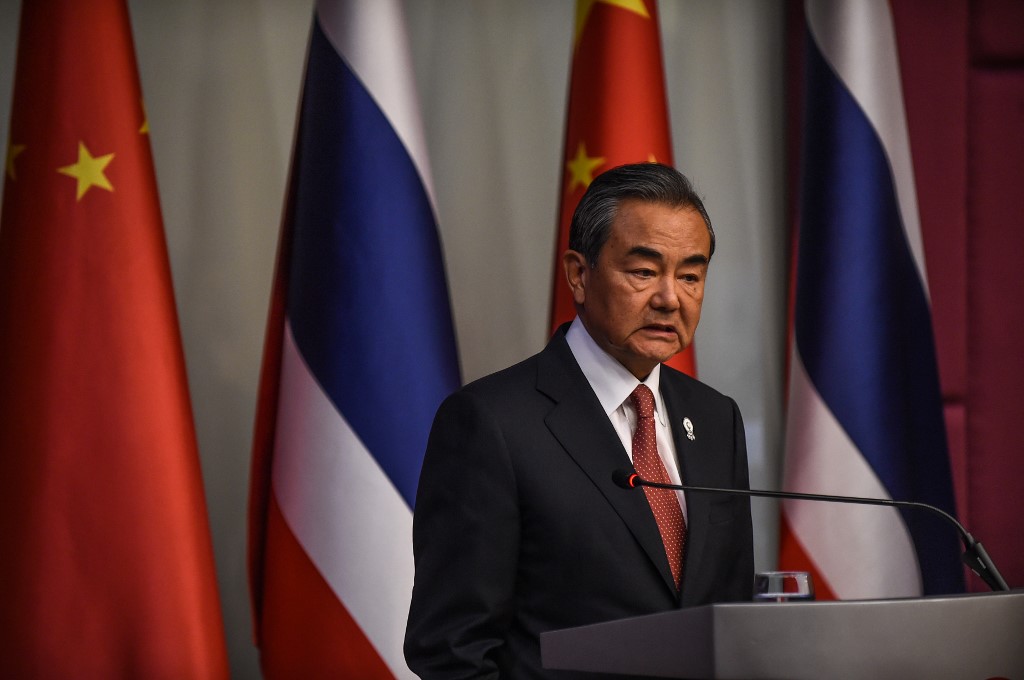SUMMARY
This is AI generated summarization, which may have errors. For context, always refer to the full article.

BANGKOK, Thailand – China urged non-Asian nations to avoid sowing “distrust” and division over contested seas Wednesday, July 31, in a swipe at the US shortly before its top diplomat was due to arrive at a Bangkok summit bearing a message of reinvigorated American trade and security engagement in the region.
The big power rivalry, framed by a trade war that has withered global growth, has dominated the summit of Southeast Asian foreign ministers, which opened Wednesday.
Beijing’s military ambitions in contested seas and airspace are poised to rub up against a drive – led by Secretary of State Mike Pompeo – to reassert the US’ role as a key Asia-Pacific power.
China is accused of deploying warships, arming outposts and ramming fishing vessels in contested territory in the South China Sea, one of the world’s key shipping routes, which the US is desperate to keep open.
Several rival Southeast Asian claimants to the sea say Beijing has used its military, economic and diplomatic heft to slow progress on a binding Code of Conduct in the flashpoint zone.
Meanwhile, China staunchly disputes the right of outside powers – principally the US – to influence an issue in what it considers to be its “neighborhood.”
“We think non-regional countries should not deliberately amplify such differences that have been left from the past,” China’s Foreign Minister Wang Yi told reporters.
Outside countries must not “to sow distrust between China and ASEAN countries,” he added, referencing the 10-member Association of Southeast Asian Nations.
“In a word, China will continue to view ASEAN as a priority in its neighborhood.”
His comments, which did not directly reference the US, lay down a challenge to Pompeo who arrives tasked with delivering a message of reassurance over US power and influence across Southeast Asia.
The administration of Donald Trump, which yanked the US from a massive Asia-Pacific trade pact, has launched a rebranded “Indo-Pacific” security, open seas and commerce strategy.
That includes “ensuring the freedom of seas and skies; insulating sovereign nations from external coercion,” a senior State Department official said.
Pompeo is set to meet with his Chinese counterpart on Thursday, August 1.
Bomber patrol
Fresh security tensions will also get an airing, including an unprecedented joint China-Russia bomber patrol last week that angered Japan and South Korea.
While China denies it flouted Japanese or Korean airspace, the exercise has rattled Tokyo and Seoul – and posed a new test of Washington’s influence in a region home to the two crucial US allies.
In a sign of the increasingly complex diplomacy knotting Asia, Japan and Korea are also locked in a bitter dispute over World War II-era forced labor.
The row has bled into trade ties, with Tokyo restricting exports of key chemicals used by Seoul’s world-leading chip and smartphone industry.
Hours before reaching Bangkok, Pompeo said he would meet the foreign ministers of both countries and “encourage them to find a path forward.”
“They’re both great partners of ours. They’re both working closely with us on our effort to denuclearise North Korea… So yeah, I hope we have a good conversation, we can help them get to a good place,” he told reporters.
But China and Russia, who are enjoying increasingly close ties, are seeking to counterbalance US moves in Southeast Asia.
Ministers from ASEAN, the Association of Southeast Asian Nations, are set to raise the issue of free trade in their talks with the US and China this week.
On Wednesday Chinese state media said negotiators from the two superpowers had held “frank” and “constructive” talks in Beijing, agreeing to meet again in September to find a way through the damaging trade row.
The tariff war has brought new jobs to some Southeast Asia nations as manufacturers relocate to swerve US levies.
But it has also deflated demand across the export-led region.
Opening the Bangkok summit, Thailand’s Foreign Minister Don Pramudwinai urged an end to growing protectionist trend.
“We must recognize that looking inward and being myopic is not our option and never will be,” he said, adding it is essential to ensure “free flow trade.”
Ongoing US-led attempts to prod North Korea into giving up its nuclear weapons program are also expected to be discussed in Bangkok, with China, Japan and South Korea all present.
But it was unclear if the North Koreans would make an appearance.
“We haven’t received a name yet,” Thailand’s Don added late Wednesday. – Rappler.com
Add a comment
How does this make you feel?
There are no comments yet. Add your comment to start the conversation.